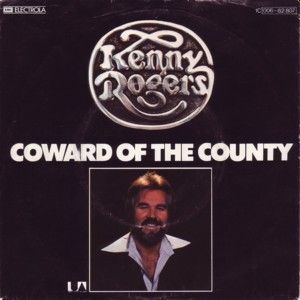Channel J: The Complicated Morals of the Coward of the County

To someone who grew up in the 1990s like me, the country music genre was dominated by great performers like Garth Brooks, Brooks & Dunn, Reba McEntire and Shania Twain, and a few of the older hit makers like Johnny Cash and Dolly Parton were still around.
One singer stood above them all in my mind, and that was Kenny Rogers. He had a long and prolific music career and he left us in March of last year, effectively getting to skip the entire Coronavirus hysteria and allowing us the small mercy of never having to find out which side he would’ve fallen on, whether he would’ve masked up and gotten vaccinated or argued that it was all a scam.
There are certain songs of his that I grew up with and which I still listen to today. “Sweet Music Man” is probably my all time favourite song of his. It was also covered by Reba McEntire, and I listen to her version, too. He also had one of the greatest country collaborations ever, a song with Dolly Parton called “Islands in the Stream” (oddly enough, the song was written by the kings of the Disco era, the Bee Gees).
He had the fortunate timing of collaborating on an all-star country version of “America the Beautiful” which was released in 2001 and which also accidentally became a 9/11 tribute song when it re-entered the charts after the attack.
Kenny Rogers is most famous for singing perhaps one of the greatest story songs of all time. “The Gambler” is not some tragic tale of love gone wrong or of someone dying a tragic death, but of a man giving advice to the next generation. The man is only known as The Gambler and at the end of the song, the lyrics strongly suggest that he passes away peacefully in his sleep: “somewhere in the darkness, the gambler, he broke even.”
Today, I’d like to discuss one of Kenny Rogers’ lesser known songs. I say ‘lesser known,’ but it was apparently popular enough to have been covered by Alvin & the Chipmunks (they also covered “The Gambler“). “Coward of the County” tells the story of a man named Tommy, who had been raised to be a pacifist, and whose father had died in prison. It’s never disclosed why his father was in prison, but analysis of the lyrics suggests that he was jailed for violent crimes and had since repented.
One of the lessons his father had taught Tommy makes up the chorus of the song.
“Promise me, son, not to do the things I’ve done
Walk away from trouble if you can
Now it won’t mean you’re weak if you turn the other cheek
I hope you’re old enough to understand
Son, you don’t have to fight to be a man”
The song begins by telling us about Tommy and his role as the titular “coward of the county.” Not the coward of the entire state, thankfully, just of his local county. It’s more alliterative that way and very fortunate for him that his legend only went so far. The narrator of the song mentions having an inking that everyone was reading him wrong, which offers a little bit of foreshadowing for what’s to come.
After delivering the initial moral of the song, the next verse sets up a situation where Tommy must question the moral and decide what action he’s going to take. We’re introduced to a woman named Becky, who loves him for who he is and not whether or not he’s a big and strong man. He can be kind and gentle with her without having to prove how much of a Gaston he is.
While he’s out at his job, Becky is beaten up by a trio of brothers named the Gatlin boys, and although the song doesn’t mention it, it’s very likely they raped her as well. The question you might be thinking is, why doesn’t Tommy go to the police? Well, the song was released in 1979. Even today, women still sometimes have a hard time getting the police to take rape seriously. On top of that, Becky was beaten up in her own home. If Tommy wasn’t lucky, the police might have pressured Becky into changing her story and pointing the finger at Tommy himself. Given his father’s checkered and violent past, he would’ve been the perfect suspect, and I’m also willing to bet that the Gatlin boys might have had friends in the police department. That wouldn’t necessarily have been the case, but if they were so bold as to just randomly break into Tommy and Becky’s home and rape her for no reason other than they wanted to, they clearly didn’t care about law enforcement catching them.
This is when Tommy hears his father’s words again, but despite that they were delivered as a pacifist message, he knew what had to be done.
For twenty years, he’d followed his father’s advice and let himself be known as a coward. Legend of his cowardice had become so widely known that the entire county knew about it. So when he showed up at the bar where the Gatlin boys hung out, they basically laughed in his face.
And then he beat them to a pulp.
The odds were three against one, and I can’t imagine the Gatlin boys didn’t have a lot of experience fighting. The song suggests that Tommy had snapped and nothing could stop him, but I’m not entirely sure that a man with no experience in a fight could take down the Gatlin boys without having prepared ahead of time. I could not take on three people at once in a bar brawl and expect to come out ahead. Tommy had to have been taught how to fight from somewhere. He just never needed it until now.
He could’ve taken self defense classes, or he could’ve taken private lessons from someone. It’s also possible he learned how to fight from his father, but the song goes to great lengths to show that the relationship between Tommy and his father was that of a man wanting his son to be better than he was, and a son wanting to live up to that ideal.
Even at the end, Tommy felt like he had to apologize to his father and the chorus changes to fit his apology.
“I promised you, Dad, not to do the things you’ve done
I walk away from trouble when I can
Now please don’t think I’m weak, I didn’t turn the other cheek
And Papa, I should hope you understand
Sometimes you gotta fight when you’re a man”
Except that I don’t think that the apology is completely necessary. Sure, as I said, the police might’ve been able to handle it, but then I also outlined a possible outcome where that would’ve been bad for Tommy. It’s also highly probable that Tommy will get away with defending Becky’s honour like this without law enforcement knocking at his door, but I’ve seen enough episodes of Law & Order and CSI to know that sometimes, the bad guys have a trick up their sleeve. I did suggest earlier that the Gatlin boys might have friends in the police department who let them get away with their antics.
The song ends with an ironic echo of the first line, suggesting that Tommy’s time as the coward of the county is past him now.
The song leaves several threads dangling which we’re supposed to fill in ourselves. It’s not stated whether or not Tommy paid a price for his actions, but I get the feeling we’re supposed to believe he walked out of that bar a hero. Even so, I can’t help thinking that poor Becky will never be the same again. Even if she wasn’t raped and was only violently assaulted, that’s still going to affect her. Becky basically got the rough end of the deal in this story. I know we’re supposed to imagine that she was totally fine once she heard that her rapists were beaten up, but at the same time, the song also stated that Becky liked Tommy because he didn’t go around beating people up.
“Coward of the County” suggests to the listener that there are situations where you have to fight, and one of those situations is when you’re defending your woman’s honour. Unfortunately, it conveys the idea that being a pacifist is akin to being a coward, since Tommy suffered twenty years of consequences for listening to his father’s advice, and yet I feel like Tommy listened right to the very end. Although he changed it at the end to “sometimes you gotta fight when you’re a man,” I do believe that Tommy still followed his father’s advice to “walk away from trouble if you can” and he had nothing to apologize for by ending what the Gatlin boys had begun. We’re supposed to believe that the Gatlin boys have been defeated forever, that there were no consequences for Tommy, and that Becky will turn out completely fine somehow.
Incidentally, there is a film adaptation which follows this interpretation pretty closely, but assigns a better motive to the Gatlin boys than just because they felt like it, and the Gatlins are arrested after being beaten up by Tommy. Tommy really does suffer no consequences, and as far as I can tell, Becky’s expected to recover and be fine with being the victim of a violent crime, even though Tommy joins the Marines and is shipped out immediately after getting married to her.
“Coward of the County” is a complicated song with complicated morals, and while it’s not one of the more famous songs in the discography of Kenny Rogers, it’s still worth a look today, if only to see how the values of the late 1970s differ from the values of today.






Well stated! I always liked this song.
Thank you for the thorough analysis of the song. I had never considered Becky’s long term wellness as a result of the Gatlin boys encounter, though like you, I always wondered whether she was grateful for Tommy’s act of retribution or disappointed. The ending has always troubled me. Since the final refrain says “everyone considered him the coward of the county” and I was very young when I first heard it, I always assumed the citizens of the county continued to believe Tommy was a coward after the incident with the Gatlin boys. To me the song drives home the importance of first impressions and the futility of trying to change others’ perceptions (not that changing others viewpoints was Tommy’s motivation for beating down the Gatlin boys). It also made me question whether pacifism was the preferred course, as consistently turning the other cheek could affect one’s standing within their community (again the song reflects the values of people from before 1980). Perhaps if Tommy had proved his mettle at some earlier point in life when stakes were lower, the Gatlin boys would have kept their distance from Becky in the first place. Or maybe the Gatlin boys were terminal bullies who, like Trump, were never held accountable for their actions and this further emboldened their bullying ways. In any event, I appreciate you discussing this gem from the Rogers vault.